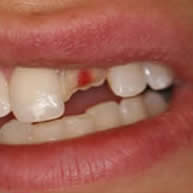Sedation dentistry is an excellent choice for patients who are extremely fearful and anxious regarding dental procedures, or for all patient types who are unable to control their bodies due to age, neurological disorder or other physical or mental difficulty. It can allow the dentist to perform the work quickly and in safety, ensuring the best treatment and quickest recovery for patients.
The medications used in sedation dentistry are very safe and don’t have many side effects. None is addictive. While this is true, most drugs have side effects and if you utilized sedation dentistry for your dental procedure, you may notice some of these feelings:
- Dizziness
- Disorientation
- Dry mouth
- Headache
- Nausea
- Hiccups
- Delayed response
- No memory of the event (retrograde amnesia)
The majority of these side effects will abate following treatment and are almost never cause for additional medical intervention.
Oversedation is the greatest risk of any sedation dentistry. Patients who have certain medical issues can be of higher likelihood to reach a deeper level of sedation than necessary (or recommended). Patients who are obese, have sleep apnea, or any cardiac, hepatic, renal, central nervous system or pulmonary disease are at risk.
Oral sedatives should be given with great care to those who are pregnant, elderly or drug or alcohol abusers. They may have a greater effect than intended. Dentists try to use the lowest effective dose of a sedative to cut down on sedation complications. It is important that you answer honestly any questions asked about your health by the dentist or the dental staff to ensure that you are comfortable during your procedure, but also that you also have the safest procedure possible.
Sedation dentistry, when administered by a qualified dental professional in the safety of a dental office, can provide the best possible stress-free experience during a dental procedure.






